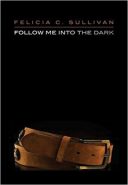
Book Review: Follow Me Into the Dark by Felicia C. Sullivan
Reviewed by Rebecca Skidmore Biggio
Follow Me Into the Dark
A novel by Felicia C. Sullivan
Feminist Press, March 2017
$16.95; 320 pp.
ISBN-13: 978-1558619456
If the mothers in Felicia C. Sullivan’s Follow Me Into the Dark are terrifying, locking their children in basements and bathing their babies in bleach, the daughters are even more so. Sullivan’s first novel is less a murder mystery, though the antics of the twisted “Doll Collector” loom large on its pages, than an investigation of intergenerational madness and matrilineal inheritance. With a nod to infamous charismatic killers Ted Bundy and Charles Manson, Sullivan imagines what a woman of similar psychological makeup might look like, wielding mental illness and its legacy like a weapon in a patriarchal culture.
The women of Follow Me Into the Dark experience family as possession by men, and Sullivan raises the question: is the madness of women the result of an overbearing patriarchy, or do the men in their lives and the limitations imposed upon them make a convenient excuse for their inherent violence? Sullivan’s story unfolds as her characters become flesh on the page, making overtures toward connection, becoming frustrated, and reacting in ways that are brutal and terrible and somehow entirely truthful. While watching her mother die, Kate, the novel’s central protagonist, also watches video interviews with Manson and Bundy. Kate considers Bundy’s relationship to his mother and how charming he was, and remains, even as a known murderer. It is when Sullivan exposes these messy complexities of character that her story is most engaging. It is hardly clear whether Sullivan’s women are victims or aggressors, and the overlap of these roles exposes the characters as fully human, flawed and believable, even if they cannot be trusted to tell the truth or know it for themselves.
“There was no room for fear in our house,” Kate says, implying, as the larger story suggests, that the opposite of fear is violence, or perhaps the acute mental illness from which violence grows. Follow Me Into the Dark could be a literary tribute to nineteenth century women writers Kate Chopin or Charlotte Perkins Gilman, written in the style of horror master Stephen King. After all, it is the film version of King’s The Shining that Kate watches as a child, “because it comforts me like record played again and again.” The raw terror of Sullivan’s novel lies in her depiction of family, of motherhood, not as safe haven but as private, internal danger. The horror comes from within, from inside the house, from inside the family, from inside the mind.
Rebecca Skidmore Biggio is a Mentor for the Afghan Women’s Writing Project. Her critical essays have appeared in Arizona Quarterly and African American Review.


Leave a Reply